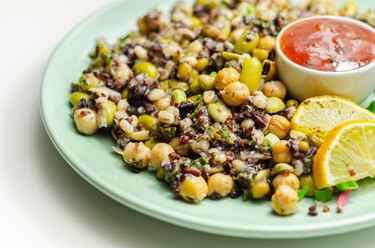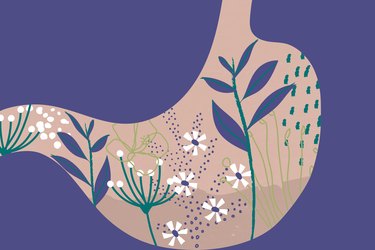
Whatever you call your gut — your belly, tummy or even the microbiome — when it's not working right, you know it. Taking care of your gut health by eating the right foods has several benefits, from improving immunity to preventing certain diseases and conditions.
Luckily, we know that there are some foods that are great for gut health. Specifically, many types of carbohydrates are key to a happy belly, and you can start adding them to your diet today.
Video of the Day
Video of the Day
Carbohydrates, Prebiotics and Probiotics
Before you take a deep dive into learning about which carbs are best for your gut health, it's important to get some definitions out of the way.
Carbohydrates: Carbs are one of the three main macronutrients (the other two are fat and protein). Carbohydrate foods are broken down into glucose in our digestive system to give us quick and sustainable energy. You might hear carbs separated into two separate categories — simple sugars and complex carbs.
What you may not know is that most nutritious foods have a mix of simple sugars — the type of sugar that can be broken down quickly — and complex carbs — larger molecules that usually contain fiber and take longer to digest.
Probiotics: Probiotics are living organisms that you can take in and, depending on which type you eat, can help diversify your gut bacteria — which has been shown to have health benefits.
You might be advised to take a probiotic or eat foods high in probiotics after treatment with antibiotics. Antibiotics kill off all the bacteria in your gut — good and bad — so diversifying and building up your gut bacteria is important.
Prebiotics: This word is not as commonly known as probiotics, but equally as important. Prebiotics are what keep your gut bacteria healthy and fed. All prebiotic foods contain fiber, but not all fibers are prebiotics. There are specific foods with just the right kind of fiber that makes it a prebiotic.
The 10 Best Carbs for Gut Health
Your gut health is not only important for digestive regularity (i.e. helping you poop), but it can also affect your overall physical and mental health, and influence your risk for chronic disease, according to Harvard Medical School.
1. Asparagus
You might not automatically think of asparagus as a carb, but as it turns out, the veggie has a specific type of carb that is super beneficial to your gut health.
Asparagus contains a prebiotic fiber called inulin, according to March 2018 research in Current Developments in Nutrition. The inulin fiber in asparagus "has been associated with healthy digestion and the production of beneficial bacteria," says Jeanette Kimszal, RD. Asparagus is a favorite gut health food of hers due to its health benefits and versatility in cooking.
Inulin is a type of carb that's created by plants, and it's not digested by the body. Rather, it serves as the "food" for the good probiotic bacteria in your gut, which makes it a great nutrient for digestive health, according to the Cleveland Clinic.
That being said, fermentable inulin may cause symptoms in people with digestive conditions like irritable bowel syndrome (IBS).
2. Potatoes
Potatoes are often dismissed as a healthy food option because they are high in starchy carbs, but in reality, they're full of important nutrients — especially when it comes to gut health.
Digestive health dietitian Jenna Volpe RD, LD, is a big fan of potatoes for gut health. Not only are they inexpensive, easy to digest and versatile in cooking, but "they contain resistant starch, which is a special type of prebiotic that helps feed lactobacillus and other probiotic microbes in the gut."
3. Onions and Garlic
If you've spent any time in the kitchen lately cooking up your favorite dishes, you've probably used some onions and garlic. Onions and garlic are part of that family of prebiotic foods that have inulin, which is beneficial for your gut, per the Cleveland Clinic.
Most people can benefit from adding foods with inulin to their diet, according to August 2021 research in BMJ Neurogastroenterology.
4. Mushrooms
Mushrooms are super trendy right now and for good reason. They are incredibly versatile as an ingredient in multiple cuisines, and they can even serve as a plant-based meat substitute.
Many dietitians recommend eating mushrooms for gut health. "Mushrooms have beta-glucan, a type of fiber that supports the immune system," says Jean LaMantia, RD.
Beta-glucan fiber is another type of carb that feeds probiotic bacteria in the gut, most notably lactobacillus and bifidobacteria, according to a November 2018 review in The Journal of Nutritional Biochemistry.
5. Oats
Oats are another source of gut-healthy fiber. "My favorite carb for gut health would have to be oats," dietitian Bethany Keith, RD, tells LIVESTRONG.com. "Oats have prebiotic fiber called beta-glucan that feed the healthy bacteria in your gut."
Oats are often touted for their beneficial effects on lowering cholesterol, but thanks to the beta-glucan fiber, they are also great for gut health — making them a solid choice for accomplishing multiple health goals.
If you want the most fiber benefits from your oats, it's probably best to eat your oats as opposed to drinking oat milk, Keith says. That's because some of the fiber is lost during the production of oat milk.
6. Apples
Your head may not go straight to fruit when you think of gut-healthy carbs, but you can get those benefits from nature's sweet treats too.
"One of my go-to snacks for gut health is apples," says Allison Herries, RD. "Not only are apples delicious, but they also contain a type of soluble fiber known as pectin. Pectin acts as a food source for the good bacteria in our gut to help maintain healthy digestion."
Pectin is a type of gel-like starch or fiber that has been shown to have antioxidant and anti-tumor properties, according to the Cleveland Clinic. It can also protect your intestinal lining, decrease your risk for bacterial diseases and improve bacterial diversity in your gut (a marker of good gut health).
And when you're eating your apples, keep the skins on to get the most gut health benefits, Herries says. "The skin of the apple has the highest amount of pectin."
7. Bananas
Bananas get a big endorsement for promoting good gut health all around. "Bananas are a source of prebiotics which feeds the good bacteria in your gut and help you maintain a healthy digestive system," says Elysia Cartlidge, RD.
Kristin Draayer, RD, also recommends bananas for gut health, especially if some of the highly fermentable foods, like onions and garlic, cause you to feel gassy and bloated. "The fibers found in bananas are slowly fermented in your gut and are usually better tolerated, so you get the benefit without the discomfort," she says.
Green bananas are not typically mentioned as a nutritious option for gut health, but Elizabeth Ward, RD, highly recommends them. "They actually have more resistant starch than their yellow counterparts. Resistant starch is a type of carb that feeds gut bacteria and promotes gut health and overall health."
8. Kefir
Dairy foods might not come to mind when thinking about carbs, but foods like kefir can have up to 13 grams of carbs per serving. On top of that, kefir has live and active probiotic cultures, which have gut health benefits.
Kefir is typically made from dairy milk (though you can now find dairy-free kefir at the grocery store), and it goes through a process of fermentation, which allows the natural bacteria to feed on the starch and sugar in the food, according to Harvard Health Publishing. This ultimately promotes the growth of beneficial enzymes.
"Kefir is an excellent source of probiotics, which have been shown to reduce inflammation and help with digestion," says Kristi Ruth, RD.
9. Quinoa
Quinoa is still a darling of the food world and it's staying power is attributed to its rather impressive nutrition profile. Quinoa is classified as a seed, and it's also a complete protein which makes it a highly desirable choice for those eating a plant-based diet. It's also gluten-free, which is ideal for people with Celiac disease or gluten intolerance or sensitivity.
"Quinoa is my favorite carb for gut health because of how versatile and easy it is to add to your diet, says Megan Byrd, RD. "It's high in fiber, which helps keep your digestion regular. It also has a ton of prebiotics which help feed the good bacteria in your gut."
Quinoa can increase the growth of two specific types of good bacteria in the gut, Bifidobacterium and Collinsella, per October 2021 research in Food Science and Nutrition.
10. Legumes
Legumes are not one singular food, but a family of foods including beans, peas and lentils, to name a few. Legumes are notorious for being high in fiber, which naturally makes them a standout choice for gut health by dietitians.
Keeping the gut healthy requires eating the right types of fibers to stimulate the growth and diversity of good bacteria. "My favorite foods for gut health are ones that help produce butyrate, a short-chain fatty acid that helps support a balanced gut microbiome by feeding the good guys. It also helps reduce gut inflammation," says Christina Lombardi, RD. For this benefit, she recommends foods like oats, apples and — you guessed it — legumes.
If legumes are new to your diet plan, start by adding them in slowly to keep any digestive issues like gas and bloating at bay.
Tips When Eating for Gut Health
Because most gut-friendly carbs have a good amount of fiber, there are some things you should remember before eating more of them.
- Go slow: Always increase fiber slowly to avoid any digestive discomfort. The recommended daily amount of fiber is 28 grams to 35 grams per day for adults, according to the USDA 2020-2025 Dietary Guidelines for Americans. If you're not getting this much right now, increase by a few grams each day until you get there.
- Stay hydrated: As you begin to eat more fiber, it's always a good idea to drink more water as well to avoid constipation.
- Diversify: Choose a wide variety of prebiotic and probiotic carbohydrate foods for the most benefit.
- Current Developments in Nutrition: "Health Effects and Sources of Prebiotic Dietary Fiber"
- BMJ Neurogastroenterology: "Psyllium Reduces Inulin-Induced Colonic Gas Production in IBS: MRI and in Vitro Fermentation Studies"
- The Journal of Nutritional Biochemistry: "A Critical Review on the Impacts of β-Glucans on Gut Microbiota and Human Health"
- Food Science and Nutrition: "In Vitro Study of the Effect of Quinoa and Quinoa Polysaccharides on Human Gut Microbiota"
- Harvard Medical School: "Diet, Disease, and the Microbiome"
- Cleveland Clinic: Inulin Benefits
- Cleveland Clinic: What Are Prebiotics?
- Harvard Health Publishing: How to Get More Probiotics
- USDA: 2020-2025 Dietary Guidelines for Americans
Was this article helpful?
150 Characters Max
0/150
Thank you for sharing!
Thank you for your feedback!


